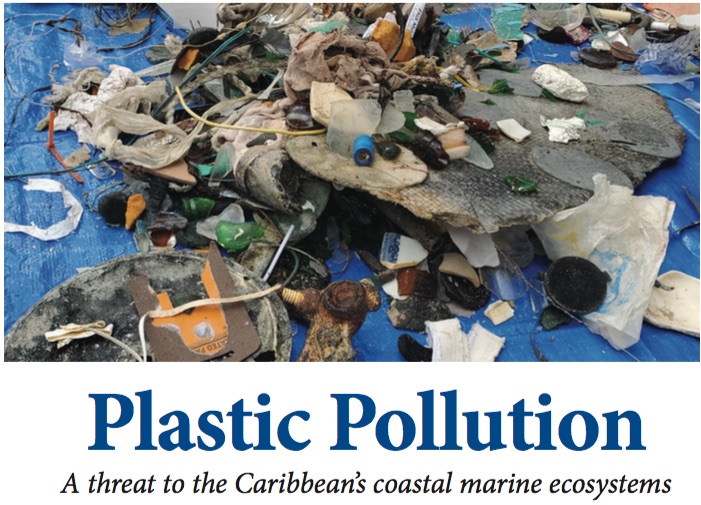
Did you know that the Caribbean Large Marine Ecosystem (CLME) is recognised as the most biodiverse region in the Western Tropical Atlantic Ocean?
Within this region, the coastal and marine ecosystems (beaches, mangrove swamps, seagrass beds, coral reefs and the deep sea) provide crucially important habitats for resident and migratory organisms. Coastal communities rely on these ecosystems and the provisioning, regulating, supporting and cultural services that they provide, which directly impact human well-being. Yet, the biodiversity within this region is under severe threat due to several stressors, such as climate change, overharvesting of natural resources, coastal development, pollution, and abnormal influxes of Sargassum seaweed.
At the global scale, several initiatives have recognised the importance of our interconnected oceans and set ambitious goals that aim to address some of these stressors like plastic pollution. Under the 2030 agenda for Sustainable Development, Goal 14 (Life Below Water) aims “to conserve and sustainably use the oceans, seas and marine resources for sustainable development”. Target 14.1 specifically aims “to prevent and significantly reduce marine pollution of all kinds, in particular from land-based activities, including marine debris and nutrient pollution” by 2025. The United Nations (UN) also declared a Decade of Ocean Science for Sustainable Development (2021-2030), with the hope that, at the end of 10 years, there will be six specific outcomes: A Clean Ocean, A Healthy and Resilient Ocean, A Productive Ocean, A Predicted Ocean, A Safe Ocean, and An Accessible Ocean. It is envisioned that one of these ambitious decade outcomes will be “a clean ocean where the sources of pollution are identified, quantified and reduced, and pollutants removed from the ocean”.
It is clear that coastal and marine ecosystems within the CLME are important, and that plastic pollution is one of several anthropogenic stressors putting pressure on these ecosystems. It is therefore imperative that action, underpinned by sound scientific data, must be taken to mitigate plastic pollution. However, the scientific initiatives in this present decade must build upon those that have been undertaken in the decades preceding this one.
It is in this context that study “The status of marine debris/litter and plastic pollution in the Caribbean Large Marine Ecosystem (CLME): 1980–2020” was conceived and conducted (https://authors.elsevier.com/a/1eatLzLNSc6cu). Published in the scientific journal Environmental Pollution, the study sought to assess the state of knowledge (between 1980-2020) on the distribution, quantification, sources, transport and fate of marine debris/litter and microplastics in the coastal/marine environment of the CLME, and the effects of plastics on biodiversity within the CLME. It is the identification of existing knowledge gaps for the Caribbean region that will guide us to prioritise critical areas for future research.
Within the CLME, there have been several snapshots of information based on both peer-reviewed studies and citizen/science-led initiatives such as the International Coastal Clean-up (ICC) events. These snapshots identify marine debris (of which plastic is generally the major component) as a persistent issue in multiple ecosystems and environmental compartments. While plastic debris within the region originates from both land and marine-based sources, the former is more significant. Rivers have been identified as important in transporting mismanaged land-based waste to the marine environment, while oceanic currents transport plastic debris into, inside of, and out of the region. The studies and initiatives prove that plastic debris is a threat to the biodiversity of the CLME.
Plastic pollution is a persistent issue that demands action at all levels. Available data can already inform measures to mitigate the leakage of plastic waste into the marine environment. However, greater efforts are needed to better understand the problem, its causes and effects.
At the latest United Nations Environment Assembly (UNEA5) meeting, there was the historic adoption of a resolution that will pave the way for a global treaty on plastic pollution within the next few years. There is therefore global consensus that plastic pollution is an important environmental issue that must be addressed along with issues such as climate change. Trinidad and Tobago and the Caribbean likewise must include it as a priority issue.
To read “The status of marine debris/litter and plastic pollution in the Caribbean Large Marine Ecosystem (CLME): 1980–2020”, visit https://authors.elsevier.com/a/1eatLzLNSc6cu
To read “From Pollution to Solution. A global assessment of marine litter and plastic pollution”, go to https://www.unep.org/resources/pollution-solution-global-assessment-marine-litter-and-plastic-pollution.